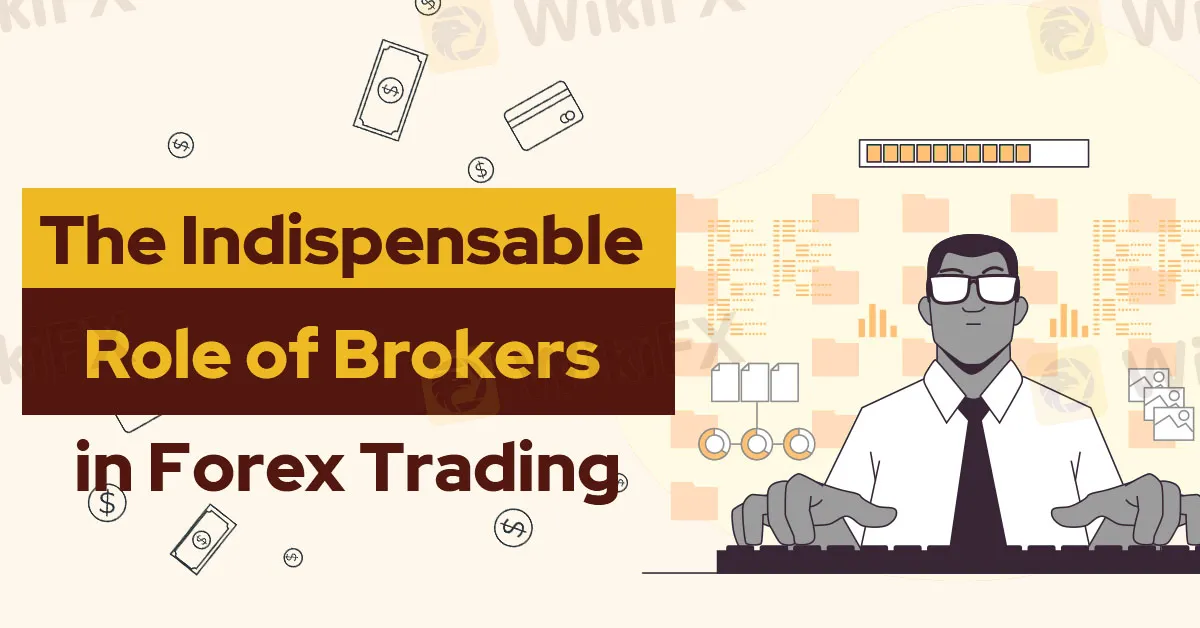简体中文
繁體中文
English
Pусский
日本語
ภาษาไทย
Tiếng Việt
Bahasa Indonesia
Español
हिन्दी
Filippiiniläinen
Français
Deutsch
Português
Türkçe
한국어
العربية
The Indispensable Role of Brokers in Forex Trading
Abstract:Forex trading, a dynamic and potentially lucrative endeavor, is often viewed as a solitary journey of individual investors navigating the vast financial markets. However, beneath this perception lies a fundamental truth: traders cannot trade effectively without a broker. These intermediaries, far from being mere facilitators, play an indispensable role in the intricate tapestry of Forex trading. Here’s why traders simply cannot do without a broker.

Forex trading, a dynamic and potentially lucrative endeavor, is often viewed as a solitary journey of individual investors navigating the vast financial markets. However, beneath this perception lies a fundamental truth: traders cannot trade effectively without a broker. These intermediaries, far from being mere facilitators, play an indispensable role in the intricate tapestry of Forex trading. Heres why traders simply cannot do without a broker.
1. Access to the Financial Markets:
Forex brokers act as gateways to the global financial markets. They provide traders with the essential infrastructure needed to participate in currency exchange. Brokers are connected to major financial institutions and liquidity providers, enabling traders to access diverse currency pairs and execute trades swiftly. Without a broker, traders would lack the necessary channels to enter the market, severely limiting their trading opportunities.
2. Leverage and Margin Trading:
Brokers allow traders to leverage their capital, magnifying their trading power. Through margin trading, traders can control larger positions in the market with a relatively smaller amount of capital. This amplifies potential profits but also entails higher risks. Brokers facilitate this process, providing traders with the leverage they need to capitalize on market movements. Without brokers, the concept of leverage and margin trading would be inaccessible to individual traders.
3. Market Analysis and Research Tools:
Experienced traders rely on in-depth market analysis and research to make informed trading decisions. Brokers offer a myriad of analytical tools, charts, and indicators that assist traders in evaluating market trends and predicting price movements. These resources are essential for devising trading strategies and managing risk effectively. Brokers provide access to real-time data and research materials, empowering traders with the information needed to navigate the volatile Forex market.
4. Order Execution and Risk Management:
Brokers execute traders‘ orders in the market, ensuring that buy and sell transactions are carried out accurately and swiftly. Additionally, brokers offer risk management tools such as stop-loss and take-profit orders. These tools enable traders to automate their trades, setting predefined points to limit potential losses or secure profits. Brokers facilitate the seamless execution of these orders, enhancing traders’ control over their investments.
5. Regulatory Compliance and Security:
Reputable brokers operate under strict regulatory frameworks imposed by financial authorities. These regulations are designed to protect traders from fraud, ensure fair practices, and maintain market stability. Trading with a regulated broker provides a layer of security, assuring traders that their funds are held in segregated accounts and that the broker adheres to ethical standards. Trading without a broker exposes traders to significant risks, including falling victim to scams or unregulated entities.
In essence, brokers are the cornerstone of the Forex trading ecosystem. They empower individual traders by providing essential market access, analytical tools, order execution services, and regulatory protection. Attempting to trade without a broker is akin to navigating uncharted waters without a compass; its not just challenging but inherently risky. Traders rely on brokers not only for opportunities but also for the security and resources needed to thrive in the competitive world of Forex trading. As such, brokers remain the invaluable partners that enable traders to turn their aspirations into tangible financial achievements.

Disclaimer:
The views in this article only represent the author's personal views, and do not constitute investment advice on this platform. This platform does not guarantee the accuracy, completeness and timeliness of the information in the article, and will not be liable for any loss caused by the use of or reliance on the information in the article.
Read more

OctaFX Flagged by Malaysian Authorities
OctaFX has been officially listed on warning lists by both Bank Negara Malaysia (BNM) and the Securities Commission Malaysia (SC). These alerts raise serious concerns about the broker’s status and whether it is legally allowed to operate in Malaysia.

Why Your Worst Enemy in Trading Might Be You
Be Honest With Yourself: Are You Slowly Destroying Your Trading Account?

TradingPRO: A Closer Look at Its Licences
In an industry where safety and transparency are essential, the regulatory status of online brokers has never been more important. For traders seeking to protect their capital, ensuring that a platform operates under recognised and stringent oversight can make all the difference. Keep reading to learn more about TradingPRO and its licenses.

A Guide to Intraday Forex Trading You Can't Miss Out
Intraday trading where everything happens in a day fascinates millions around India and worldwide. The drama, the hype, and the ups and downs resulting from those are nothing short of an adventure. Read this guide to ace the forex intraday trading game.
WikiFX Broker
Latest News
How much money will you earn by investing in Vantage Broker?
IronFX vs Exness Review 2025: Comprehensive Broker Comparison
Fraudsters Are Targeting Interactive Brokers' Users with Lookalike Emails
Interactive Brokers: Global Office Visits and Licensing Details
Top Tips to Choose the Best Forex Broker in 2025
SEBI Notifies New F&O Rules for Investors - New Derivative Trading Limits & More Amendments
U.S. Jobs Data Released: A Potential Boost for Gold Prices
SkyLine Guide 2025 Malaysia: 100 Esteemed Judges Successfully Assembled
Everything you need to know about ADSS
Vantage Markets Review 2025: Trusted Forex and CFD Trading Since 2009
Currency Calculator


